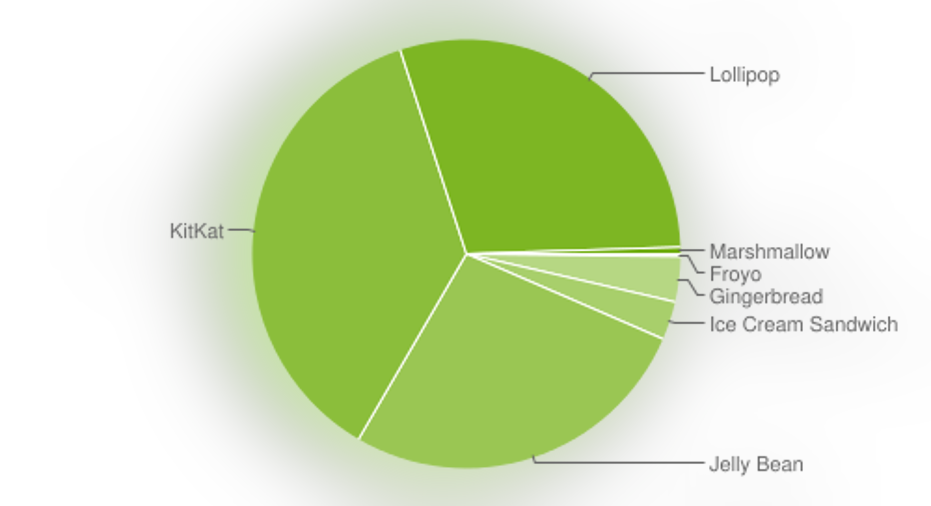Almost No One is Using Android Marshmallow

Photo: Alphabet
Fewer than 1% of Android devices are running the latest version of the Android 6.0 Marshmallowoperating system. Originally released in October, Marshmallow includes a number of major updates that bring significant improvements toAlphabet's mobile operating system.
The low install base isn't surprising, but it does highlight the continued challenges facing Alphabet's platform. It alsostands in stark contrast toApple's competing iOS, as the overwhelming majority of iPads and iPhones sport up-to-date versions of Apple's operating system.
A two-year old version of Android dominatesJust 0.5% of Android devices are running Marshmallow, according to data published by Alphabet. Marshmallow'spredecessor, Android Lollipop (released in the fall of 2014), is far morepopular, powering 29.5% of Android devices. But the most common version of Android is KitKat. Originally released in 2013, it's running on 36.6% of Android devices. Older versions of Android, including Jelly Bean, Ice CreamSandwich, and Gingerbread, power 6.5% of Android devices.
Android install base of as December 7. Source: Alphabet
The opposite is true for Apple's iOS. A full 70% of iDevices were running the latest version of Apple's mobile operating system, iOS 9, as of the end of November. iOS 8, released in 2014, powered 22%, while older versions accounted for just 8%.
Admittedly, iOS 9 was released in the middle of September -- about one month before Marshmallow -- so the comparison is not completely fair. Still, by almost any measure, iOS 9's adoption rate trounces Marshmallow's. It already powered about one-fifth of iDevices 44 hours after its release, according to data from Mixpanel.
iOS install base. Source: Apple
The trend continuesThis phenomenon isn't new: previous versions of Android also suffered from sluggish adoption rates. But it does serve to highlight the fragmentation of Alphabet's platform. Handset manufacturers and carriers must often collaborate to roll out new versions of Android to existing devices. The disjointed process often causes multi-month delays -- only a handful of different Android devices currently support Marshmallow, and if you purchase a new Android device today, chances are that you will get a device running some version of Android Lollipop.
That's unfortunate for Android owners, as newer version of the operating system often bring new features. One of Android Marshmallow's most impressive new features is Now on Tap. Using Alphabet's Google Now technology, Now on Tap scans an Android device for whatever is currently going on, then returns contextually relevant information. Now on Tap can tell you the lead singer of a song that's currently playing on an Android device, for example, or bring up recommendations for nearby restaurants if you're texting a friend about getting dinner. It's a great feature and a unique selling point -- something Apple's iPhone notably lacks -- but most Android users can't take advantage of it today, and likely won't be able to for several months (if at all).
It also poses challenges for Android developers, as they must continue to support a wider range of Android versions. Mobile developers continue to favor Apple's iOS, releasing new apps first for Apple's platform before eventually bringing them to Android. Android's fragmentation may be a contributing factor.
Android Marshmallow's low install base isn't surprising, but it is unfortunate, and it highlights the limitations of the Android platform.
The article Almost No One is Using Android Marshmallow originally appeared on Fool.com.
Sam Mattera has no position in any stocks mentioned. The Motley Fool owns shares of and recommends Alphabet (A shares), Alphabet (C shares), and Apple. Try any of our Foolish newsletter services free for 30 days. We Fools may not all hold the same opinions, but we all believe that considering a diverse range of insights makes us better investors. The Motley Fool has a disclosure policy.
Copyright 1995 - 2015 The Motley Fool, LLC. All rights reserved. The Motley Fool has a disclosure policy.



















